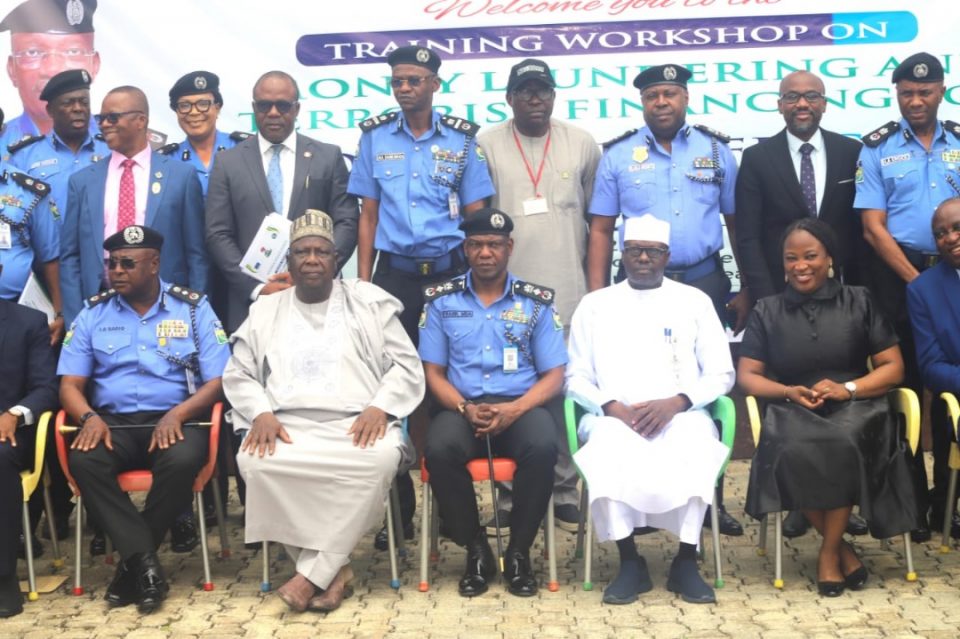Photo caption from left: Deputy Inspector-General of Police, Force Criminal Investigation Department, DIG Sadiq Idris Abubakar; Chairman Police Service Commission (PSC), Hashimu Salihu Argungu, DIG (retired); Deputy Inspector-General of Police (Department of Training and Development), DIG Frank Mba; Director Police Services Department, Ministry of Police Affairs, Mr. Ibrahim Muhammed; Representative of Minister of Justice, Jamila Akadade, and participants during the Training workshop on Money Laundering and Terrorist Financing for Frontline Officers and Prosecutors held at the President Goodluck Ebele Jonathan International Peacekeeping Centre, Force Headquarters, Abuja.
By Charles Okonji
As part of government’s renewed efforts in curbing insecurity that is currently ravaging the country, the Minister of Police Affairs, Senator Ibrahim Gaidam, has stated that the Money Laundering and Terrorism Financing section of the Nigeria Police Force (NPF) will greatly complement the NPF’s efforts in fighting insecurity in Nigeria.
Gaidam stated this during the Training workshop on Money Laundering and Terrorist Financing for Frontline Officers and Prosecutors held at the President Goodluck Ebele Jonathan International Peacekeeping Center, Force Headquarters, Abuja.
The Minister speach which was read by the Director, Police Services, Ministry of Police Affairs, Mr. Ibrahim Muhammed, stated that the workshop will present a valuable opportunity to enhance their skills and share expertise on how to tackle these bedbugs, called Money laundering and terrorism financing.
According to him, “The Frontline officers and prosecutors will play a vital role in disrupting financial crimes and terrorism financing networks. This workshop will equip participants with the knowledge, skills, and best practices to tackle these complex challenges.
“As the Minister of Police Affairs, I want to assure the Inspector-General of Police and all officers present that I will continue to support initiatives that would strengthen our nation’s security and justice system”.
He called on the recently established special section entitled, “Anti-Money Laundering and Countering the Financing of Terrorism Section of the NPF” to seize the opportunity to utilized the data from the Crime and Incidence Database, the upcoming Criminal Data Fusion Center and the West African Police Information System database all at the Nigeria Police Force Headquarters to boost their operation.
He commended the initiative of the Inspector-General of Police in creating this section of the NPF, adding that money laundering and terrorism financing pose significant threats to national security by undermining financial systems, enabling organized crimes, and providing resources for terrorist activities.
“These illicit activities can destabilize economy, erode public trust, and create an environment conducive to violence and instability.” He stressed.
Earlier, the Inspector General of Police, IGP Kayode Adeolu Egbetokun, represented by the Deputy Inspector General of Police (Training and Development), DIG Frank Mba pointed out that Nigeria continues to grapple with twin trends of money laundering and terrorism financing through complex crimes that not only weakens the economic foundations, but also tarnishes the international reputation of the country.
According to him, “To address this, the Federal Government has undertaken commendable steps by establishing specialized agencies such as the Economic and Financial Crime Commission (EFCC), the Independent Corrupt Practices and Other Related Offences Commission (ICPC), the Nigerian Financial Intelligence Unit (NFIU), and the National Counter Terrorism Centre (NCTC). These institutions form the backbone of the institutional response to financial crimes and terrorism.”



